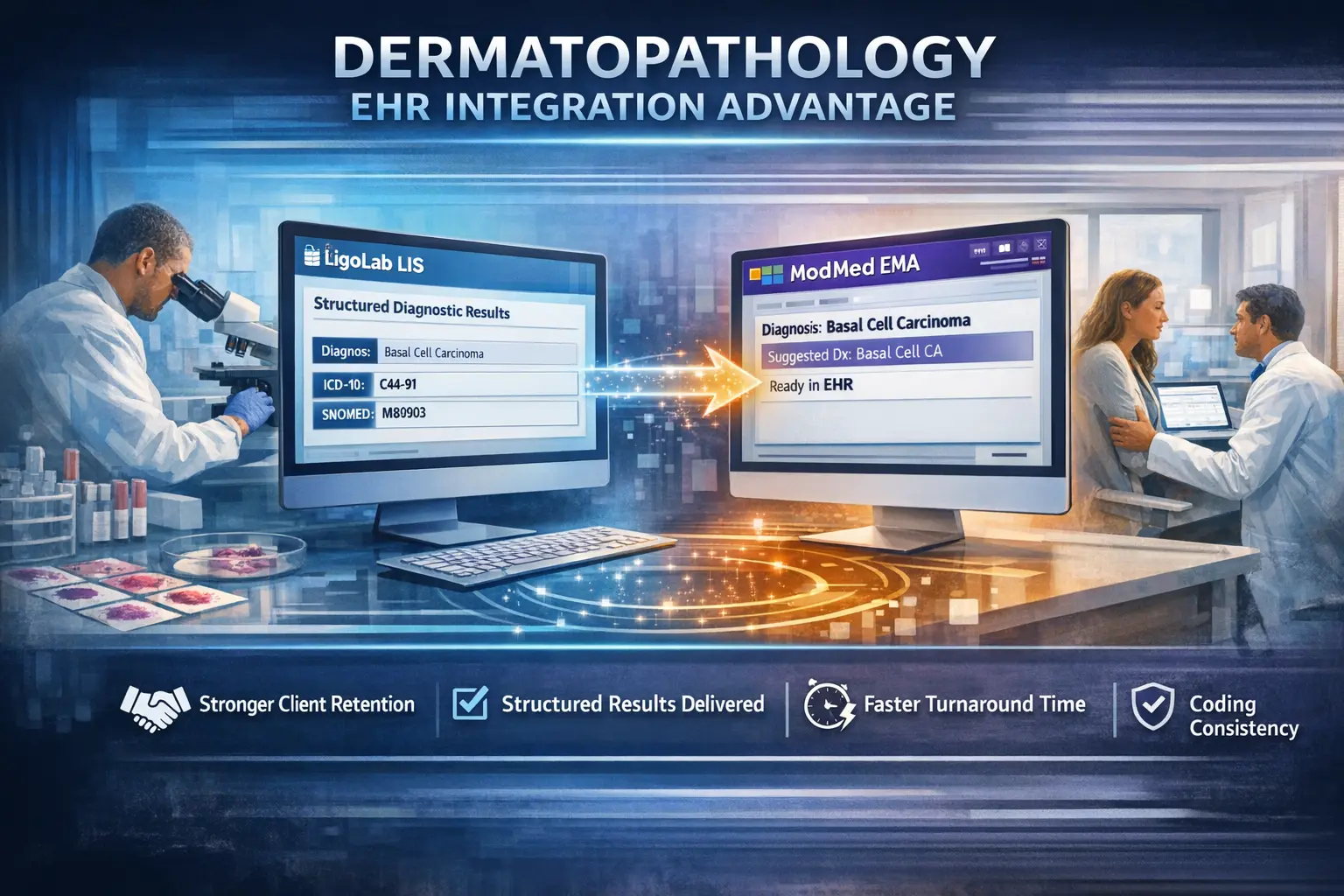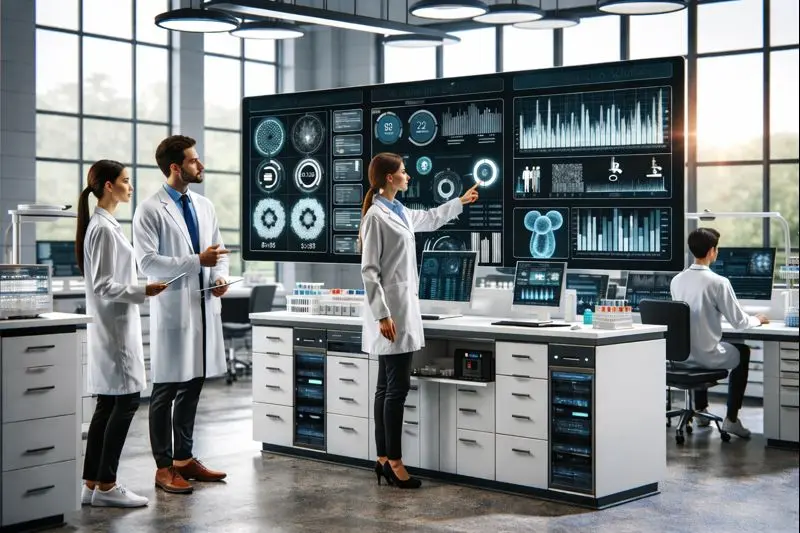Blog
Medical LIS Systems and LIS in Healthcare
January 30, 2026
The healthcare sector generates and relies on enormous volumes of patient data, and managing that information effectively is essential for producing meaningful clinical insights and improving patient outcomes. Laboratory information systems, the core diagnostic lab software platforms used by pathology groups and clinical laboratories, play a central role by supporting day-to-day laboratory workflow management while organizing, processing, and securely storing critical patient and specimen data.
Industry Insights: Best LIS Systems in 2026 - Top Laboratory Information Systems Compared for Clinical, Pathology, and Outreach Labs
What is LIS in Healthcare?
Great question.
You could think of a modern medical laboratory information system (LIS) as part of healthcare’s operational nervous system. It serves as a comprehensive clinical and pathology lab management platform that coordinates and streamlines all lab workflow, from multi-department order intake and specimen tracking to diagnostic processing and report generation. The best LIS software also supports laboratory revenue cycle management (lab RCM) with advanced laboratory billing solutions embedded within the same informatics environment.
Laboratory information systems are foundational to modern healthcare operations. They help accelerate turnaround times, reduce manual errors, such as specimen mislabeling, and bring structure and consistency to lab workflow management, all of which contribute to improved patient safety and service quality.
In parallel, electronic health record (EHR) platforms are essential for hospitals and provider organizations. When tightly integrated with LIS systems, EHRs enable faster, more reliable access to patient clinical data, laboratory results, and related records across departments and care locations, supporting better-informed clinical decisions.
Discover More: Laboratory Information Systems vs. Electronic Health Record Systems - Which is the Best Choice for My Hospital Lab?

The Inner Working of LIS Systems
Think of LIS systems/medical LIS as automated lab data management entities with reporting capabilities. They process laboratory test results and produce lab reports. Physicians review the results and interpret the tests to obtain definitive diagnoses and plan courses of treatment. LIS lab personnel track orders, produce reports with test results, access historical results for patients, and generate statistical reports.
Laboratory information systems have become a foundational component of today’s modern laboratories. A well-designed LIS software platform reduces diagnostic risk and strengthens clinical decision-making by accelerating turnaround times, automating repetitive steps, and replacing paper-based processes with controlled digital lab workflows, all of which help physicians act quickly and confidently on accurate results.
Unlike legacy clinical and anatomic pathology LIS platforms with constrained capabilities, a modern laboratory information system also helps reduce compliance exposure by reliably capturing, structuring, and preserving complete test data within fully traceable, audit-ready records.
Laboratory information systems may also work in tandem with hospital information systems (HIS), management software programs used by lab technicians, doctors, nurses, and other healthcare professionals in hospitals.
Industry Insights: The Rise and Fall of CoPath LIS - A Legacy Casualty of the Modern Lab Information System Era
LIS in Healthcare: What are the Benefits?
Laboratory information system software has played a central role in the technological evolution of medical laboratories. The field has progressed significantly from the era of largely manual LIS lab workflows, and legacy medical LIS platforms now fall short in both functionality and interoperability compared with today’s modern LIS software solutions.
White Paper: Comparing LigoLab Informatics Platform with Legacy Laboratory Information System Software
Laboratory professionals depend on LIS systems to coordinate both inpatient and outpatient testing across disciplines such as immunology, chemistry, microbiology, and hematology. From the moment a test is ordered through specimen processing, analysis, and final reporting, a well-designed lab information system securely manages and tracks patient and test data at every stage of the laboratory workflow.
Top labs use the best LIS software in healthcare to do the following:
- Automate laboratory workflow management
- Integrate data from other laboratory software systems
- Support laboratory equipment and supplies management
- Create customized reports by analyzing generated data
- Facilitate on-demand access to these reports for physicians
- Allow easier access to patient data
- Ensure reliable sample tracking and lab results
- Improve efficiency for laboratory billing processes
- Provide better communication between hospitals and laboratories
Get Insight: The Best Laboratory Information Systems - LIS Software Solutions for Clinical and Pathology Labs
How to Use Laboratory Information System Functions in Medical Settings
LIS system software helps lab operators collect and organize data. The LIS lab solution collects data from other systems such as magnetic resonance imaging (MRI) machines, CT scans, and laboratory instruments/analyzers.
Hospitals and clinics appreciate the role of the LIS in healthcare because it efficiently manages the testing process while ensuring that every step complies with regulatory requirements.
An LIS system routes laboratory data directly into a centralized patient information repository. Depending on the deployment model, that data may be stored on local servers or in secure cloud infrastructure supported by modern LIS system platforms. In either case, authorized users can quickly retrieve and visualize the information as individual results or aggregated trend charts.
Clinical information applications draw from this same patient data source, and the LIS delivers it through user-friendly views, including result reports, dashboards, and graphical displays, to support efficient review and clinical decision-making.
Industry Insights: Examining the Pros and Cons of Cloud-Based LIS System Solutions

Independent Laboratories and LIS in Healthcare
If you operate an independent laboratory with high testing volumes, upgrading to an advanced laboratory information system LIS software is a smart move. It enhances lab workflow speed and efficiency, impresses both patients and customers with reliable service, and gives your team quick access to historical patient data for smoother, more informed testing and diagnostics.
In anatomic pathology and clinical laboratories, the medical LIS helps information flow while generating results that aid patient care. The process includes:
- The pre-analytical phase
- The analytical phase
- The post-analytical phase
Pre-Analytical Phase
The LIS system facilitates test ordering, specimen collection, and processing in this phase.
Analytical Phase
This stage involves routing specimens to the appropriate analyzers for data processing and results generation, facilitated by the LIS system.
Post-Analytical Phase
This phase covers the delivery of test results, report creation, critical value flagging, and complete record documentation.
Discover More: Transforming Patient Care - The Power of Laboratory Information Systems (LIS) in Healthcare

LigoLab's All-in-One Laboratory Information System Software Solution
The healthcare sector is growing as all parties focus on the number one goal: providing better services to their patients. As a result, hospitals and clinics are demanding more sophisticated LIS and lab RCM tools to help them manage their processes. That's where an advanced laboratory information system comes in. The LIS system helps labs support these hospitals and clinics by increasing efficiency, reducing costs, and improving patient care.
Advanced LIS System Technology and Training That Empower Modern Laboratories
Medical laboratories play a vital role in the healthcare ecosystem, so it’s essential for laboratory directors and managers to rely on best-in-class LIS software to support accurate testing, data analysis, and timely delivery of critical clinical insights to physicians and care teams.
Effectively managing this volume of operational and diagnostic information requires both strong laboratory workflow expertise and a deep understanding of system capabilities. That’s why LigoLab provides comprehensive, ongoing LIS medical training and enablement programs for technicians, managers, and laboratory staff, ensuring teams can confidently use the platform’s advanced features to optimize performance and outcomes.
Learn More: What You Need to Know Before Contracting with a Laboratory Information System (LIS) Company
Key Takeaways
Laboratory information system platforms are mission-critical software solutions that enable laboratories to operate efficiently while minimizing manual errors and process variability. As medical laboratories and healthcare organizations adopt modern LIS software technology to streamline workflows and improve data integrity, leading LIS vendors play a key role in guiding successful transitions to comprehensive, highly configurable, and fully integrated LIS platforms.
Discover More: How to Set Up a Committee to Select a Laboratory Information System
Configurable All-in-One LIS Software Platform for Every Major Laboratory Workflow
LigoLab’s all-in-one LIS lab solution delivers configurable modules that support anatomic pathology, clinical laboratory, molecular diagnostics, laboratory revenue cycle management, and direct-to-consumer testing, all within a unified informatics platform.
Connect with a LigoLab product specialist and schedule your personalized LIS system demonstration to see how the platform can help your lab reach its operational and financial goals.
Act Now: Connect with a LigoLab Product Specialist!







